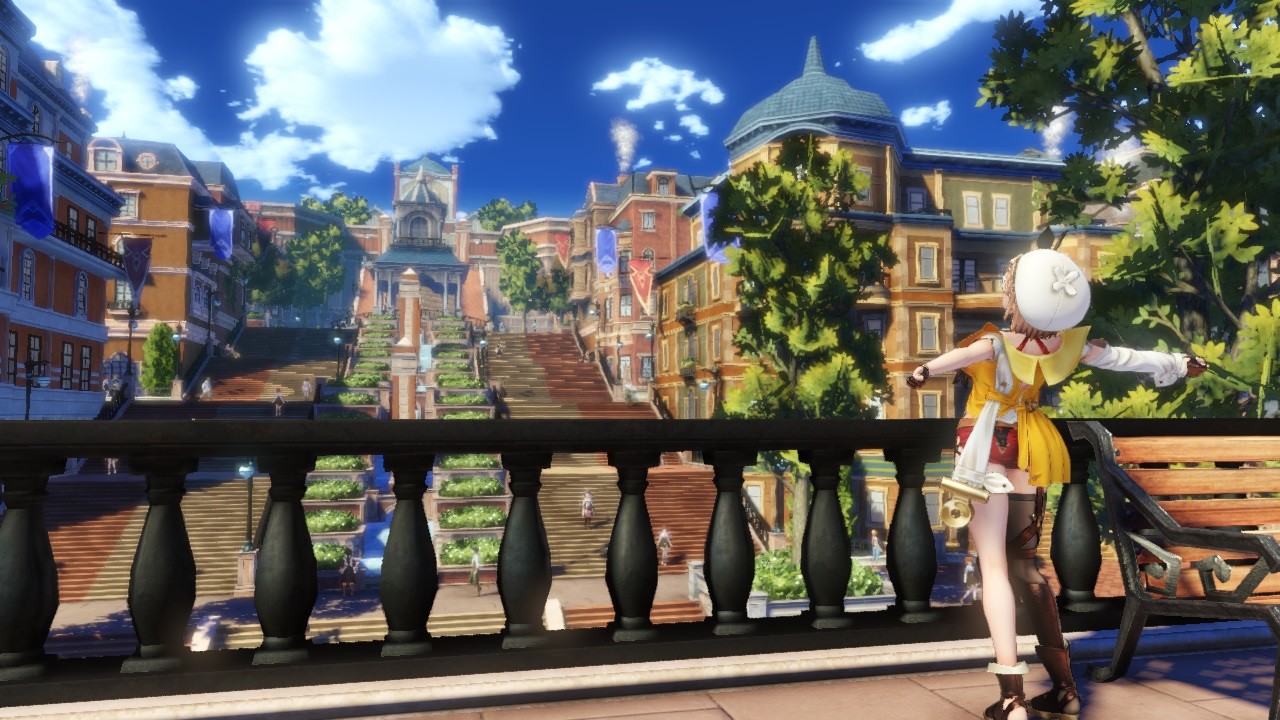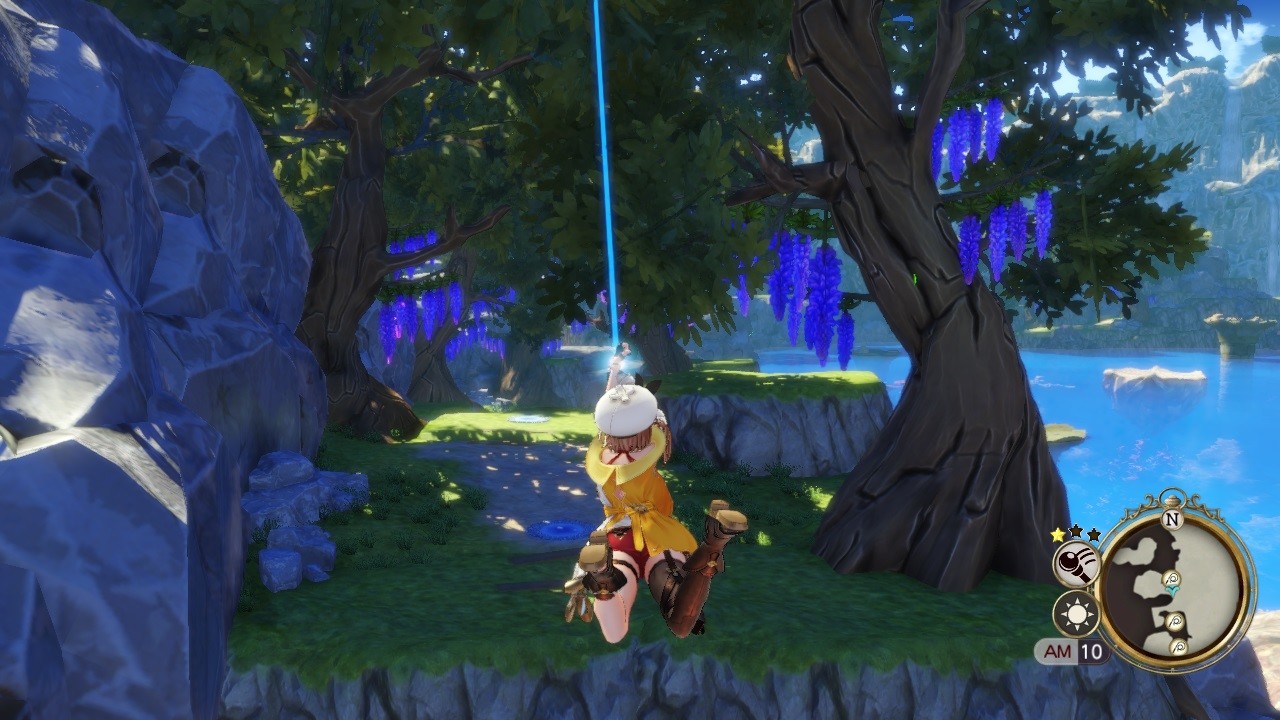
The Atelier series is well known for its focus on alchemy. Each game in the series, which dates back to the late 90’s, has emphasized its complex alchemy and crafting systems as its unique selling point. Atelier Ryza 2: Lost Legends and the Secret Fairy, developer Gust’s quickly-crafted sequel to 2019’s Atelier Ryza: Ever Darkness and the Secret Hideout, makes no less of an effort to centralize this mechanic.
But while the alchemy is certainly intricate and key to the story, it’s not as central to the game’s quality as is everything surrounding it. The game’s best moments stem from its overwhelming charm and surprisingly alive world, topped off with great new characters and small yet welcome tweaks to existing systems that make it a step up from its predecessor. It suffers from some unwelcome progression blocks and a sometimes-overwhelming amount of story, but the upbeat, lively world behind Atelier Ryza 2 make it more than just another alchemy simulator.
Atelier Ryza 2 is a direct sequel to its 2019 predecessor, taking place just months after the events of the previous game in which Ryza, the protagonist, left many of her friends behind and returned home. Within the first few moments, though, she decides she wants to leave her home on Kurken Island and travel to find new places to explore her alchemy skills, leading her to a new town called Asha-Am-Baird, which serves as this game’s hub city. There, she begins on the game’s two subtitle-spoiled adventures. The first comes from her meeting with Tao, who has returned from the first game and tells Ryza of multiple ruins not far from the city. The second comes in the form of a mysterious glowing egg that soon hatches and gives us Fi, an unexplained fairy-like creature that clings to Ryza.
"It suffers from some unwelcome progression blocks and a sometimes-overwhelming amount of story, but the upbeat, lively world behind Atelier Ryza 2 make it more than just another alchemy simulator."
At this point, the game begins to open up with an almost dizzying amount of story content. The critical path is primarily made up of exploring the ruins that Tao hears of. Each of the five main ruins has effectively the same formula but acts differently in practice, and much of their progress lies in their exploration. Within each dungeon, there is usually a clear path forward to get to the next story point that usually involves finding a path deeper inside and fighting a boss. These are mostly linear sequences within the dungeons, and the game never makes it unclear where you need to go next, which takes away much of the confusion of the dungeon crawling.
The signposting can become a bit more convoluted when you’re forced to travel outside of the dungeon, though. At points you’re tasked with finding certain items or crafting particular recipes, and while the game does a good job of handing you the required recipes, it often sets you on your way with little to no instruction as to how to find certain items or perform particular tasks. For a game that holds your hand in so many other ways, these are surprise moments of throwing you in the deep end that can bring the pace of the game’s story and living world to a screeching halt.
Around the world, the environments are all colorful and charming, including the dungeons, which are all unique, ranging from hidden underground mines to a sea-like maze, and never overstay their welcome. Even the dreariest locations emit charm with their unique enemy types and hidden treasures lying around seemingly everywhere. Naturally, there are also many questions to be answered regarding Fi and the ruins, and they begin to come together in the later hours. I wouldn’t say the reveals are entirely surprising or groundbreaking, but I felt the story was complete by the end.
"Around the world, the environments are all colorful and charming, including the dungeons, which are all unique, ranging from hidden underground mines to a sea-like maze, and never overstay their welcome."
What’s more interesting about each set of ruins is that they each have a collection of memories and clues that you can find to uncover the story of the ruins, which is done by scouring each floor for clues and putting them together in a not-so-difficult minigame of matching keyword hints and fully formed clues. While the clue finding and the critical path are generally separated, as you don’t always need to find and decipher all of the memories to progress, it’s both recommended and genuinely interesting to find all the clues, as it gives a sense of completion to the dungeon. Not only does finding the clues give you major, usually necessary boosts to your skill tree and alchemic knowledge, but this exploration also allows you to see everything the dungeons have to offer. It’s not always intuitive as to where a few hidden clues will be, even with a device that gives you their locations within a certain radius, but I was glad to have a reason to explore each set of ruins to its fullest.
Outside of the critical path, there are dozens of hours of other things to do, and they make the world feel satisfyingly lived in. One of your first encounters in Asha-Am-Baird is with your landlord, the father of one of your teammates and the mayor of the town, who tells you that you can stay in the room you’ve unexpectedly holed up in for the price of helping other citizens with their tasks. It’s not the most organic way to get you to do side quests, but it does give you a tangible reason to do so. Even though side quests for the people of the town usually boil down to using your alchemy to craft a specific item, it feels necessary, both to raise your reputation around town and keep away from your landlord, who will appear and warn you if you’re not doing enough. Your teammates, too, will give you tasks to help you learn them better and increase their stats in combat.
Some of the quests do start to get tedious, and a lot of the dialogue that surrounds them is almost begging you to skip it. Even in the main story, there’s a lot of bloated dialogue, and the fact that it’s all spoken in Japanese and only English in text makes it easy to lose focus, though it is backed by an infectious soundtrack that provides even more charm. There’s a lot of personality and humor in the dialogue if you’re willing to find it, especially in the interactions between characters in your party, who are mostly interesting enough to stay relevant, but I wouldn’t call this game concise.
"Outside of the critical path, there are dozens of hours of other things to do, and they make the world feel satisfyingly lived in."
What makes the world feel particularly alive is how there really never is a dull moment when you’re moving around town. You have a dedicated button to travel back to your atelier, and it feels like almost every time you go back, you’re greeted with a cutscene and another encounter. The same is true when you enter almost any district around the city, as people will come up to you and give you tasks or just say “hello”. The impressively short load times, even on a base PS4, make traveling like this the norm and encourage you to move at your own pace. It becomes almost overwhelming at times, getting to where I was afraid to travel around town or back to the atelier and risk having another long conversation, but I always felt the world was changing around me, not waiting for me to make a move to evolve.
What the Atelier series is known for, the alchemy, feels more like a side minigame than a true central aspect to the gameplay. As you explore the worlds, both in the ruins and in other surrounding areas, you gather a potentially infinite number of items that you can bring back to your atelier. Each of these is used in different recipes to create anything you could need in the game, from healing items to weapons or other crafting ingredients, provided you’ve unlocked the corresponding recipes. You can always go to the shopping districts and try your luck at buying items, but a neglected economy truly pushes you toward creating things yourself.
Within the alchemy, you can add different types of ingredients to affect the quality of the final product, and you ultimately have control over every aspect of any item’s creation if you want. It’s unfortunate that the actual act of fine-tuning every step of the process is generally boring. I never found the benefits of the manual alchemy to outweigh the benefits of using the auto-craft mode, which usually returns nearly the best products anyway, so the alchemy itself almost feels like a glorified crafting system whose only challenge is finding the correct ingredients around the world.
"The battle system is mostly the same as it was in the past game. Aside from a few enemies that can deal massive amounts of damage in seconds, I enjoyed the nuances of the combat."
Elsewhere, the battle system is mostly the same as it was in the past game. Aside from a few enemies that can deal massive amounts of damage in seconds, I enjoyed the nuances of the combat. It’s the same timed, pseudo-turn-based system, where you can only attack when your icon has reached the center of the timing meter and abilities like blocking slow your progression along the meter. I especially like how constantly active the combat feels. Once you gain enough AP, which you gain from simple attacks, you can begin to perform special moves that do more damage, and the AI controlling your teammates is good enough to continually perform these moves without you having to micromanage them. Even when the team is overpowered by a particularly strong enemy, it never begins to feel hopeless or loses its luster, even when you have to fight a boss multiple times. This, along with a minimal punishment for death, gives the sense that it’s on your side, which might feel forgiving but never feels unchallenging. You can always optimize your loadout and team members’ qualities at your own pace, but I never really needed to until the latter half of the game and was never entirely burdened by it.
The strengths of Atelier Ryza 2: Lost Legends and the Secret Fairy aren’t in the series’ most prominent aspects. The battle system sometimes feels too on your side, and the alchemy minigame is easily overlooked when the game can do it for you. It’s in everything else that Atelier Ryza 2 shines. The world feels both lived in and dynamic, and the environments give you reason to explore thoroughly without feeling labyrinthian in story progression. While its story can feel overwhelming at points, with its extensive dialogue and constant task-giving, I enjoyed the world and characters enough to keep moving forward. Fittingly for a game centered around alchemy, Atelier Ryza 2 only works because of its smaller aspects that work together to make something ultimately interesting, charming, and notably unique.
This game was reviewed on the PlayStation 4.
Living world; Deep exploration; Charming cast; Challenging yet forgiving combat; Diverse environments.
Disappointingly boring alchemy; Loads of unnecessary story; Occasionally unclear signposting.



















